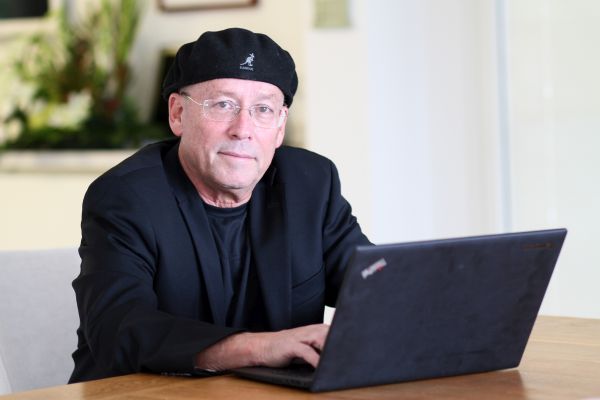FROM THE WORLD OF HIGH-TECH TO HIGHER EDUCATION
Interview with Mooly Eden: Our New Chairman of the Executive Committee
Former Intel Israel President Shmuel (Mooly) Eden joins the University of Haifa as the new Chairman of the Executive Committee. Eden is one of the most prominent figures in the Israeli technology sector in recent decades. After a remarkable 33-year career in high-tech, he has set his sights on advancing higher education in Israel.
What motivated you to join the University of Haifa after a long career in high-tech?
M.E. - When I think about the immense challenges facing our nation in the coming years – safeguarding our security through technology, maintaining economic competitiveness abroad and at home, closing socio-economic gaps and improving tolerance in Israeli society – I see education as the only factor that addresses all of these issues, and as the catalyst for strengthening the State of Israel.
After returning from the US (where I spent 9 years in Silicon Valley), I became actively involved in a national education campaign to boost the number of high-school students graduating with five units of math, which had deteriorated substantially in previous years. So, when I was first approached by the President of the University, Prof. Ron Robin and the Chairman of the Executive Committee Ami Ayalon, it seemed to me a natural progression to join the University. After spending time with Prof. Robin and the University Rector Prof. Gustavo Mesch, I sensed that we would make a good team. Higher education in general, and the University of Haifa in particular, will be facing significant challenges in the coming years, and I hope to contribute to its progress and success.
What are your views on the role of education and how can we improve it for future generations?
M.E. - Education is the future of our nation. Without education, Israel as a nation will not be able to safeguard its economic competitiveness and security. Moreover, social gaps and income inequality will continue to grow. So first, we need to internalize that education is a national priority and priority #1. Next, we need to adopt what we do in the high-tech industry, set clear goals, and come up with an action plan that is both achievable and measurable.
But, massive action plans of the sort you are proposing can be risky.
M.E. - The biggest risk in the high-tech industry, and I believe in all other sectors including academia, is not taking risks because of fear of failure. We must understand that the world is changing exponentially and this means that we need to be able to change exponentially as well. Simply continuing to do what we did yesterday is no longer good enough. The new environment leaves us no other choice but to take necessary risks for innovation and create tolerance for failure while continually striving to deliver better outcomes.
What are the challenges facing the University and higher education today?M.E. - While I leave the task of developing academic curricula up to the experts, what I can say is that much of the materials we teach students today may not be relevant 20 years from now. Universities are facing a formidable task. They must prepare students for jobs that don’t exist yet, to solve problems that haven’t been defined yet, using technologies that haven’t been invented yet! How will higher education accomplish such a seemingly impossible feat? The answer is not as simple as it sounds. Universities will need to focus on cultivating a generation of lifelong learners. As futurist and philosopher Alvin Toffler once put it, “The illiterate of the 21st century will not be those who cannot read and write, but those who cannot learn, unlearn and relearn.”

Mooly EdenChairman of the Executive Committee
You are considered one of leaders of the mobile PC revolution and “Forbes” magazine named you among the world’s top ten most brilliant minds in technology and innovation. What are the key drivers of change and innovation?
M.E. - Innovation thrives on chaos; it is not driven by set processes and procedures. Today, the speed of innovation and the pace of change and growth is so fast that in every aspect we must react swiftly. Advances in computing power, big data, artificial intelligence and machine learning are going to lead to a ‘tsunami’ of even more dramatic changes. Therefore, it is up to today’s leaders, from managers and executives to professors and chairpersons, to provide the optimal environment and knowledge while creating the necessary chaos that will drive innovation. Moreover, as these technologies begin to affect every aspect of our lives, from the way we live to the way we think, I imagine that it will also lead to changes in academic research in the humanities and social sciences. The University of Haifa is strongly positioned to lead this paradigm shift.
Highlights of exclusive interview with newly appointed Chairman of the Executive Committee, Mr. Mooly Eden
Mooly Eden speaks to us about his decision to join the University of Haifa, challenges facing higher education in the digital era, the value of teamwork in a fast-paced world and life lessons.
As the former President of Intel Israel, Eden is considered among the most influential tech leaders in recent decades. Following a remarkable 33-year career in high-tech, he now sets his sights on advancing higher education.


